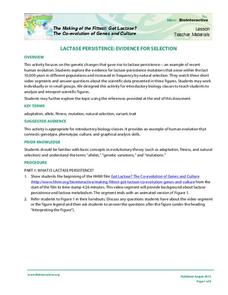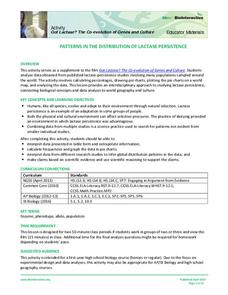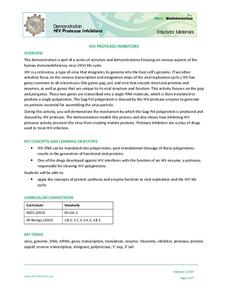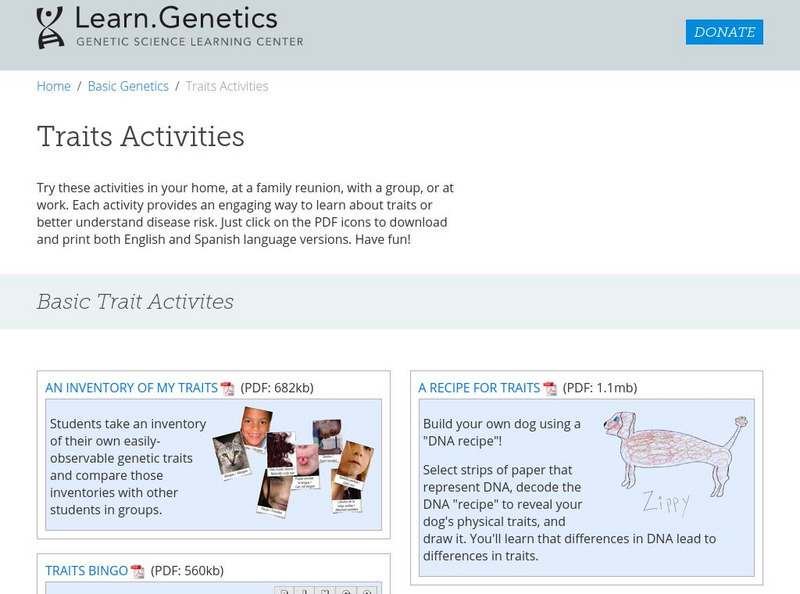National Academy of Sciences
Genetic Disease: Putting DNA to Work
Scientific knowledge of genetic information has grown quickly over the last decade. An interactive lesson has learners research the role of science and medicine in diagnosing and treating genetic disorders. They consider the job of the...
Curated OER
Implications of the Human Genome Project
Students study the Human Genome Project through classroom discussion and the video, Cracking the Code of Life. They research reports about the issues of disease, human health, and the ethical, legal, and societal implications of the...
American Museum of Natural History
Differentiate! The Stem Cell Card Game
Let the games grow. Groups play a card game to grow cells. Players start growing cells from stem cells to create specialized cells in the human body. Learners use full-grown cells from the human body to create stem cells in the lab to...
Howard Hughes Medical Institute
Zebrafish and Skin Color
You may not know if that zebrafish in your fish tank is a model citizen—but it is definitely a model organism! What can we learn about ourselves from a tiny zebrafish? Discover more about the polygenic trait of skin color through a...
Howard Hughes Medical Institute
Understanding Variation
Does where we live influence how our bodies express genetic traits? Explore variation in human skin color with an activity that incorporate video and hands-on learning. Individuals model the relationship between phenotypes and genotypes,...
Howard Hughes Medical Institute
Lactase Persistence: Evidence for Selection
What's the link between lactase persistence and dairy farming? Biology scholars analyze data to find evidence of the connection, then relate this to human adaptation. Working individually and in small groups, learners view short video...
Howard Hughes Medical Institute
Cancer Discovery Activities
Explore the genetic component of the second-leading cause of death in the world using a hands-on activity. After watching a video discussing the basics of cancer, learners complete activities that study the genes involved in cancer. The...
Howard Hughes Medical Institute
Lactose Intolerance: Fact or Fiction
Around the world, about 2/3 of adult humans are lactose intolerant. Scholars work in small groups to discuss a few statements about lactose intolerance. Then, they watch a video on the topic and readdress each statement. Whole-class...
Howard Hughes Medical Institute
Ebola: Disease Detectives
How did the Ebola virus first infect humans? Young virologists examine genetic sequences from the 2014 Sierra Leone outbreak to find similarities during a riveting activity. Following similar methods used by MIT and Harvard, partners...
Howard Hughes Medical Institute
The Molecular Evolution of Gene Birth and Death
More than 90 percent of humans' DNA doesn't code for anything! Scholars watch a presentation as they answer questions relating to gene mutations. They read details, watch videos, and view animations supporting the concepts. The questions...
Biology Corner
Pipe Cleaner Babies
Ever been told you have your father's eyes? How did it happen? Young biologists get a hands-on experience in meiotic gene expression with a fun pairs-based activity. Participants use pipe cleaner chromosomes with trait beads to make...
Howard Hughes Medical Institute
Got Lactase? Blood Glucose Data Analysis
Many physicals include a blood glucose test, but what are doctors actually testing? Scholars graph and interpret blood glucose data, allowing them to observe the differences in lactase persistence and draw conclusions. They then connect...
Howard Hughes Medical Institute
Developing an Explanation for Mouse Fur Color
Whether or not you think mice are nice, you'll love the colorful activity! Scholars examine evidence for evolution in the rock pocket mouse through video, discussion, and collaborative work. Learners watch a video regarding variation in...
Serendip
Understanding How Genes Are Inherited via Meiosis and Fertilization
Bring the excitement of genetics to scholars with a dynamic hands-on meiosis modeling experience. During the activity, biologists follow step-by-step procedures to build chromosomes, model independent assortment, learn about crossing...
Howard Hughes Medical Institute
Patterns in the Distribution of Lactase Persistence
We all drink milk as babies, so why can't we all drink it as adults? Examine the trend in lactase production on the world-wide scale as science scholars analyze and interpret data. Groups create pie charts from the data, place them on a...
Howard Hughes Medical Institute
HIV Protease Inhibitors
How do doctors fight a virus that's constantly mutating? Show science scholars how we fight HIV using one of its own most fundamental processes through a thoughtful demonstration. The lesson focuses on how protease inhibitors prevent HIV...
Howard Hughes Medical Institute
The Making of the Fittest: Got Lactase? The Co-evolution of Genes and Culture
Got milk? Only two cultures have had it long enough to develop the tolerance of lactose as an adult. Learn how the responsible genes evolved along with the cultures that have been consuming milk. This rich film is supplied with a few...
Serendip
Cell Differentiation and Epigenetics
Pregnant women exposed to PAH air pollution increase the risk of obesity in their children. The example of epigenetics, along with others, builds the basis for understanding the process of cell differentiation. Scholars view a video,...
Serendip
Using Molecular and Evolutionary Biology to Understand HIV/AIDS and Treatment
HIV mutates rapidly, making treatments challenging to find. Scholars learn about why it mutates so quickly and how scientists race to find treatments. The resource approaches the issue from both a molecular and evolutionary perspective...
Howard Hughes Medical Institute
Viral DNA Integration
How do viruses hijack our cells to produce more viral particles? Junior immunologists model how viral RNA integrates into a host cell's DNA using pop beads and use interactive tools to explore a virus' genome. The teacher's guide...
Texas Instruments
Texas Instruments: Human Genetics
This StudyCards stack enables students to review the vocabulary used in studying human genetics.
University of Utah
University of Utah: Genetic Science Learning Center: Traits Activities
A collection of genetic learning activities provides an engaging way to learn about traits, or better understand disease risk.
University of Arizona
The Biology Project: Human Biology
This site provides basic information on human genetics and reproduction using tutorials, simulations, images and quizzes. There are also links to other worthwhile sites.
University of Arizona
Biology Project: Karyotyping Activity
If you want an interactive way to practice karyotyping, this is it. There are three patient histories and karyotypes to use in diagnosing human genetic disorders. There is enough information on comparing chromosomes to get you started.
Other popular searches
- Human Genetics Pedigree
- Human Genetics Lab
- Human Genetics Karyotyping
- Human Genetics Cloning
- Human Genetics Made Simple
- Human Genetics Introduction
- Basic Human Genetics
- Genetics and Human Behavior
- Human Genetics Intro
- Human Genetics Kl
- Human Genetics Kwl
- Human Genetics Finding Genes






















